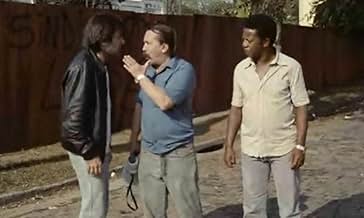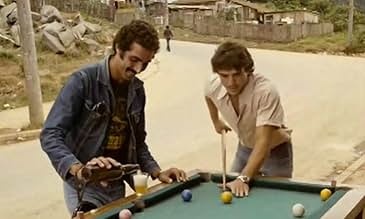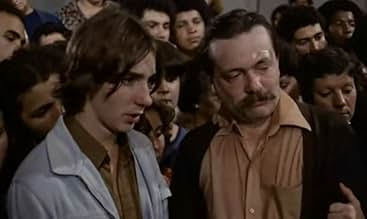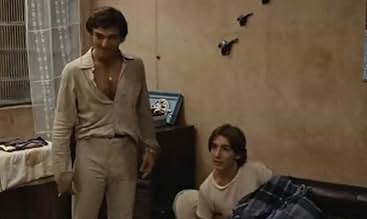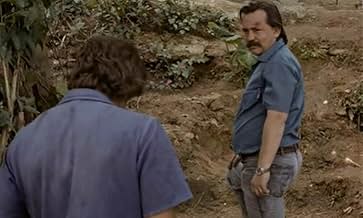Union leader's son doesn't want to engage in a strike, because his wife is pregnant, thus disregarding his father's tradition of political activism.Union leader's son doesn't want to engage in a strike, because his wife is pregnant, thus disregarding his father's tradition of political activism.Union leader's son doesn't want to engage in a strike, because his wife is pregnant, thus disregarding his father's tradition of political activism.
- Director
- Writers
- Stars
- Awards
- 10 wins & 1 nomination total
- Director
- Writers
- All cast & crew
- Production, box office & more at IMDbPro
Featured reviews
A film with great national actors, shows the maturity of the people, the shock of generations, and principles in improving working conditions, an engaging and beautiful film, highly recommended.
The filmmaker Leon Hirszman, who was a great documentarist, made few films, but great, I quote from São Bernardo in 1972. As protagonists we have the great Gianfrancesco Guarnieri (The Quatrilho of 1995) and Fernanda Montenegro (Central of Brazil in 1995).
The filmmaker Leon Hirszman, who was a great documentarist, made few films, but great, I quote from São Bernardo in 1972. As protagonists we have the great Gianfrancesco Guarnieri (The Quatrilho of 1995) and Fernanda Montenegro (Central of Brazil in 1995).
This award-winning 1981 film is as realistic a portrait as exists about the struggles of working-class families in industrializing Brazilian cities. The two families whose stories are told, live out the contradictions, violence, and almost overwhelming difficulties that are part of living in Sao Paulo, Latin America's most industrialized metropolis. The film won Fernanda Montenegro (CENTRAL STATION) one of her first international best actress awards, and the film itself was awarded the Special Jury Prize in 1981 at the Cannes Film Festival. It's definitely one of the best films to have come out of Brazil in the 80's.
Beautiful political movie about the automotive Union fights for a better life. The struggles between 2 generations in the same family: father and son. It was based on a theatrical play with an amazing screenplay.
This movie contains one of the most beautiful and sensitive scenes in cinema: wife and husband sorting and picking beans from the table, the camera focus in their eyes, hands and faces, with no single word spoken. That's enough for us to feel the bonds between them.
This movie contains one of the most beautiful and sensitive scenes in cinema: wife and husband sorting and picking beans from the table, the camera focus in their eyes, hands and faces, with no single word spoken. That's enough for us to feel the bonds between them.
An incredible work, based on a necessary play, about the importance of the union (when it served the interests of the employees), strikes and scabs, dictatorship and Dops, the somewhat slow pace almost discourages, at the beginning, the everyday situations and the impeccable characterization of the 70s, the nude scenes of a charming and subtle lyricism, Bete Mendes beautiful and talented, no comments for our queen Fernanda da Montenegro, with Guarnieri... Beautiful, revolting, courageous, passionate...
"I didn't want you to be a hero, I wanted you to be a person!"
In 1980, the life of the young worker Tião enters a real typhoon: at the same time that he finds happiness in his marriage with Maria, who is pregnant, he must face the fury of his father, a strict union leader who becomes very angry when he learns that Tião broke the workers' strike, fearing to lose his job.
"I didn't want you to be a hero, I wanted you to be a person!"
In 1980, the life of the young worker Tião enters a real typhoon: at the same time that he finds happiness in his marriage with Maria, who is pregnant, he must face the fury of his father, a strict union leader who becomes very angry when he learns that Tião broke the workers' strike, fearing to lose his job.
Latin American cinema is always hard to understand, and being a latin american myself i think i can shed some light into this movie. Its mostly a period piece, taking place soon after famous brazilian dictatorship period (1964-1984), a mostly righ-wing endeavor that left Brazil with deep scars, not only in the political department but in the cultural as well.
And as a period piece this movie really shines, encapturing Brazil social problems and culture with a very realistic tone.
Unfortunatelly thats when the good thing stop since, apart from Montenegro's shining performance and Guarnieri perfectly portraying "himself" the other actors struggle to do a decent job, most of the times they seem to be reading the lines and the restored version has some problems with audio sync, something that really takes you out of the movie.
On one hand the director tries to do sympathy with Tiao, the main character, that is put in an unfortunate position, having to choose between taking the side of his fellow workers and join a strike or keep working to provide for his family, but soon as the movie is getting close to the end this simpathy goes away and the black and white (us and them) views of the director and writer, always trying to push the class struggle agenda, really show.
The movie is, in the end, a very heavy handed political panflet, ignoring the many sides of a complicated problem and relying heavily in the "traitor! traitor!" argument, one that, as we may as well know, is not new to the political side of things.
And as a period piece this movie really shines, encapturing Brazil social problems and culture with a very realistic tone.
Unfortunatelly thats when the good thing stop since, apart from Montenegro's shining performance and Guarnieri perfectly portraying "himself" the other actors struggle to do a decent job, most of the times they seem to be reading the lines and the restored version has some problems with audio sync, something that really takes you out of the movie.
On one hand the director tries to do sympathy with Tiao, the main character, that is put in an unfortunate position, having to choose between taking the side of his fellow workers and join a strike or keep working to provide for his family, but soon as the movie is getting close to the end this simpathy goes away and the black and white (us and them) views of the director and writer, always trying to push the class struggle agenda, really show.
The movie is, in the end, a very heavy handed political panflet, ignoring the many sides of a complicated problem and relying heavily in the "traitor! traitor!" argument, one that, as we may as well know, is not new to the political side of things.
Did you know
- TriviaFinal feature film directed by Leon Hirszman. His later projects were all documentaries.
- How long is They Don't Wear Black Tie?Powered by Alexa
Details
- Release date
- Country of origin
- Language
- Also known as
- Ils ne portent pas le smoking
- Production companies
- See more company credits at IMDbPro
Contribute to this page
Suggest an edit or add missing content

Top Gap
By what name was Eles Não Usam Black-Tie (1981) officially released in Canada in English?
Answer
